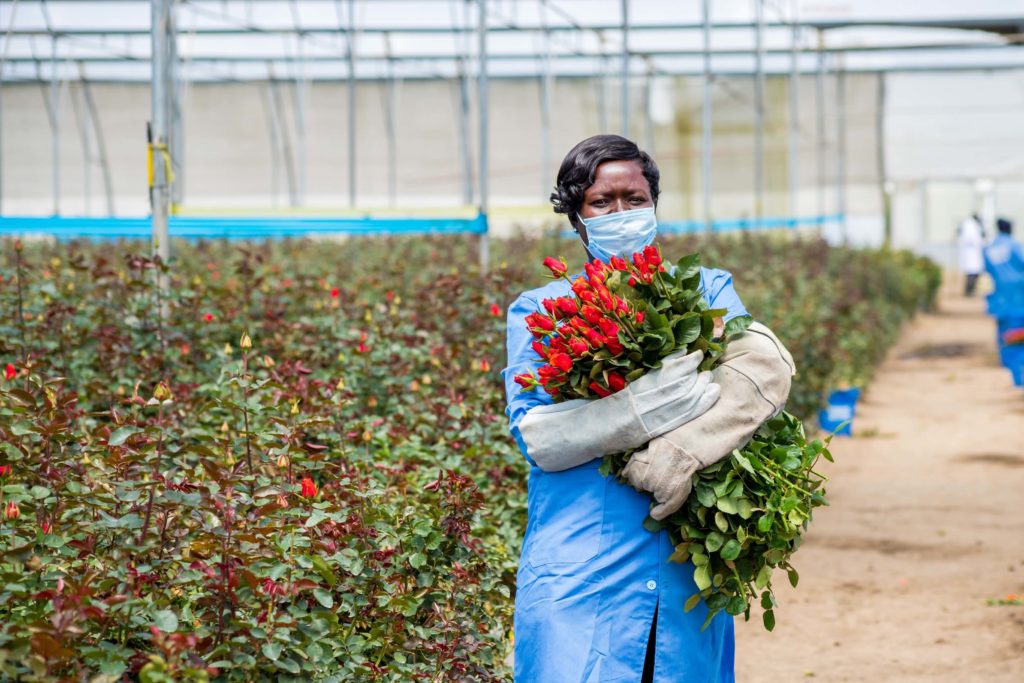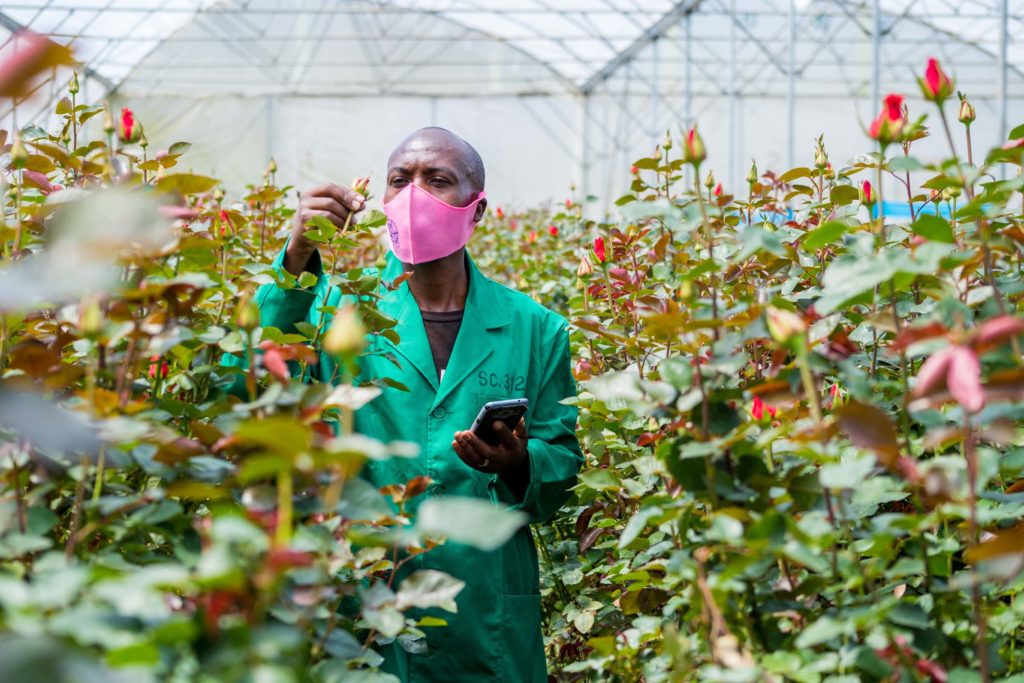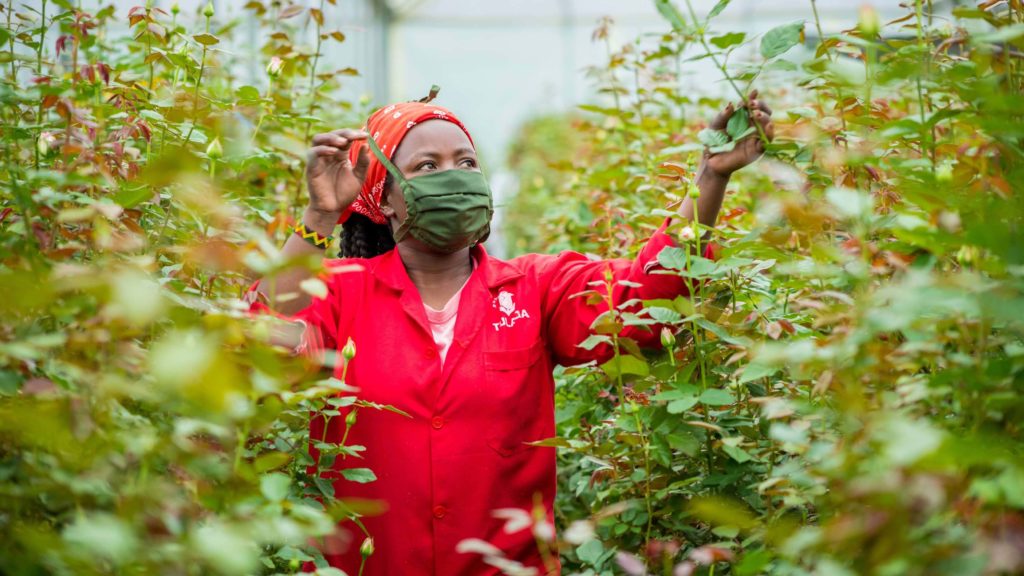The Fairtrade Foundation is shining a light on some of the people who produce one of the most iconic gifts – flowers – and sharing their stories, in their own words.
Fairtrade is committed to bringing the voices of workers to the forefront of any industry-wide conversations – including in the flower sector. That’s why, soon after the Covid-19 crisis hit, we partnered with UK-based communications agency On Our Radar to launch an innovative research pilot, called FairVoice. Our aim? To hear directly from Kenyan flower workers and their communities about their experiences of the pandemic.
A collaboration between Fairtrade Foundation, Fairtrade Africa and On Our Radar, the FairVoice pilot trained workers at four Fairtrade flower farms to become ‘reporters’. The remote training, delivered via audio and online, gave them the tools to safely gather testimonies from their communities.
Over several weeks, 60 reporters fulfilled a series of assignments to explore the impact of Covid-19 on their lives and communities. Supported by local mentors, they collected over 900 reports on issues such as jobs, finances, mental health, children and family life.
Using a toll-free number, the reporters shared anonymous reports in written, audio or video format via their mobile phones, which went to a bespoke information dashboard set up by On Our Radar. The messages were analysed by the team at Fairtrade Africa and Fairtrade Foundation, with insights shared back with reporters afterwards.
Among other things, the reports clearly showed that the Fairtrade Premium – the additional sum workers on the farm receive to invest how they choose – has played a critical role in helping flower workers and their communities meet their health, food and financial needs. That’s why, when shoppers choose to buy Fairtrade roses or other Fairtrade blooms for their loved ones this Valentine’s Day, it makes a world of difference to the people who grow, harvest, pack and care for them.
Here are some of the stories collected by our FairVoice reporters:
1. Flower farms
‘The sales for flowers kept dropping as we were faced by lockdown in various countries and [the] flight ban. Orders dropped every day, prices at the auction were at their worst ever, we dumped thousands of roses every day as we didn’t have any market…’
‘The dumping was so saddening, a lot had been put [into the production] and seeing it all thrown away felt like we were ‘throwing’ out our own livelihood… Workers kept asking, ‘Will we survive this?’ A question no one wanted to answer.’
‘The Fairtrade Premium Committee offered an extended incredible support during Covid-19 time by issuing vouchers of foodstuffs to members who are workers.’
2. Finances
‘My wife lost a well-earning job… now it’s only me working and all the money I earn goes to food alone – not able to save anymore. This has killed my vision and dreams.’
‘Most of my friends… had nothing to eat at all and others had only a meal in a day as a result of them being laid off from work. I used to share what little I have but it was really tough.’
‘I have nothing left, no asset at all and [I am] unstable financially… life has become bitter.’
3. Family life
‘It’s a social nightmare, families got locked down from each other for months, some still are. Relationships and marriages haven’t been the same since. Many homes have been broken up…’
‘Their future is going to be difficult because many parents… don’t have any income to send their children back to school.’
Reporters stories: in their own words
Here, two FairVoice reporters reflect on their experiences of the pandemic and the FairVoice project.

Joan Injete Akumu: ‘At first we didn’t think that coronavirus would be a big issue. Then it hit home… life became difficult… We got stipends from the Fairtrade Premiums, which would be added to our pay slips. This came in handy in paying house rent and taking care of other expenses.
‘I decided to join the FairVoice programme in order to understand what workers were going through during the pandemic. Joining FairVoice made me have high self-esteem. I can now interview someone and ask questions confidently and without any fear.’

Kennedy Simiyu: ‘When the first positive Covid-19 case was confirmed in Kenya, we were afraid because we didn’t really understand what the virus was… Our relationships were affected because we couldn’t interact freely for fear of contracting Covid-19.
‘Fairtrade chipped in by giving a stipend to every worker and also providing face masks and hand sanitisers to protect ourselves from the virus. Fairtrade Premiums were used in refilling our gas cylinders for every employee, as well as buying dry food stuffs for us. I also got a stipend from the [Fairtrade] Covid Relief Fund and used the funds to buy food for my family.
‘I learnt a lot from the FairVoice programme. [It] made [me] realise that Covid-19 can affect anyone or any business, not only us as workers in the flower industry.’
Valuable lessons
Reflecting on the success of FairVoice, Fairtrade Foundation’s Senior Supply Chain Manager Anna Barker says: ‘We’ve heard a lot about the pandemic’s impact on the flower industry, but the experiences of flower workers haven’t received as much attention. This innovative pilot has helped us fill that gap. It’s given Fairtrade a unique insight into the realities they face, in their own words, and a glimpse of the challenges Covid-19 has created in their communities.
‘We’re pleased the Fairtrade Premium helped so many at this time of need, as did farm-led and government support provisions. However, it is clear that flower workers may need further support as Covid-19’s longer term impacts continue.’
Fairtrade is taking forward and sharing the valuable lessons about flower workers’ experiences with others in the flower sector. We’re committed to growing the volume of Fairtrade flowers in the UK market and hope all shoppers and businesses who can, will buy and source Fairtrade flowers this Valentine’s Day and beyond – so that flower workers can rebuild their lives in the wake of the pandemic.
Read a detailed report about the FairVoice pilot (pdf)
*Joan and Kennedy’s images and stories were collected by Vincent Owino.
